Level 5 Diploma: Unit 503 Wider Professional Practice & Development
VerifiedAdded on 2023/06/14
|21
|7046
|282
Report
AI Summary
This report provides a detailed analysis of professionalism and dual professionalism in the education and training sector, with a specific focus on hospitality management at the university level. It explores how professional values influence teaching methods and techniques, and it identifies the ways in which social, political, and economic factors impact the development of educational policy and curriculum in hospitality management. The report also emphasizes the importance of working in partnership with external bodies and stakeholders, as well as the impact of accountability within the education and training environment. It highlights the need for teachers to demonstrate professional skills such as commitment, trust, respect, accountability, equality, diversity, and excellent time management. Furthermore, it discusses the influence of social factors like cultural beliefs, political factors related to government policies, and economic factors such as employment opportunities on shaping education policies and curriculum development.
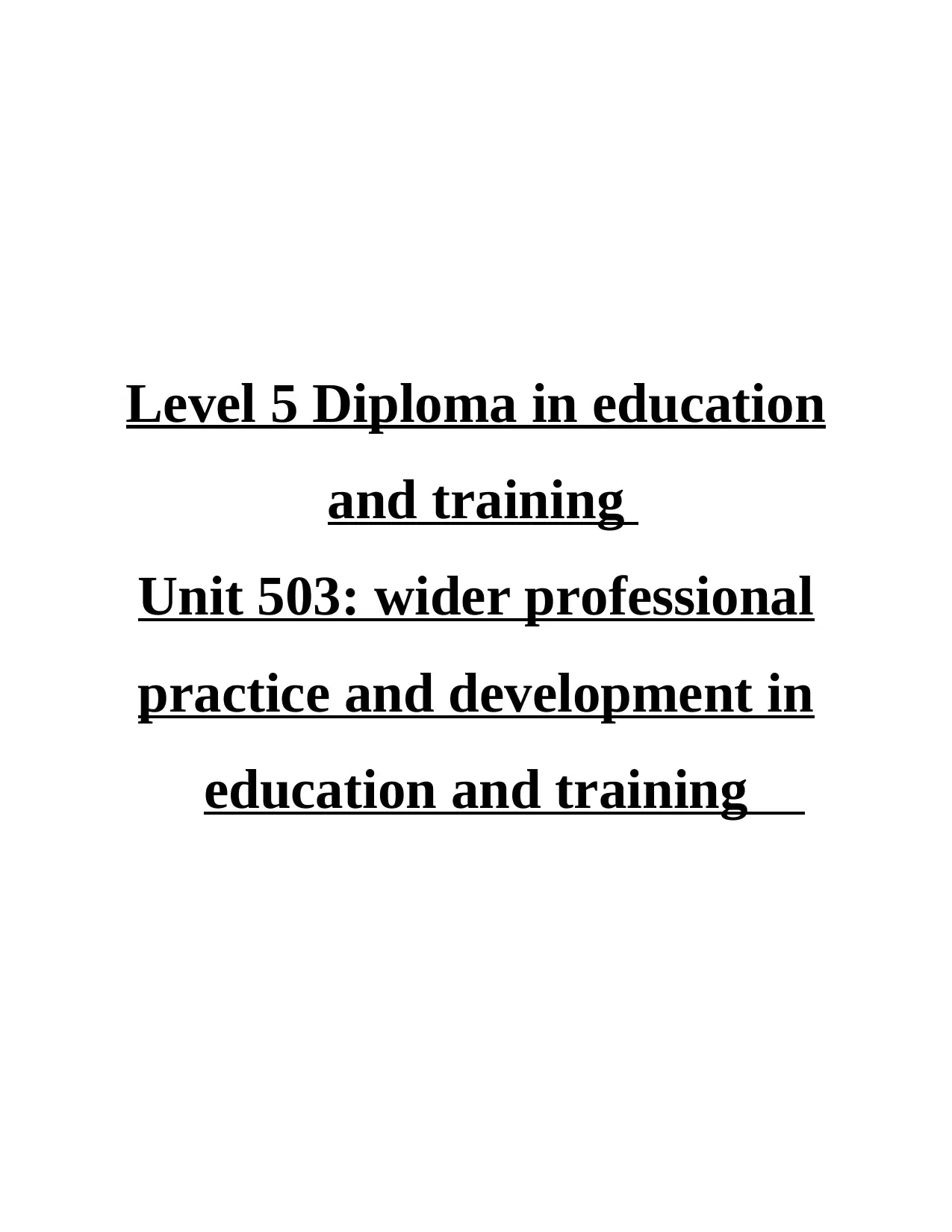
Level 5 Diploma in education
and training
Unit 503: wider professional
practice and development in
education and training
and training
Unit 503: wider professional
practice and development in
education and training
Paraphrase This Document
Need a fresh take? Get an instant paraphrase of this document with our AI Paraphraser

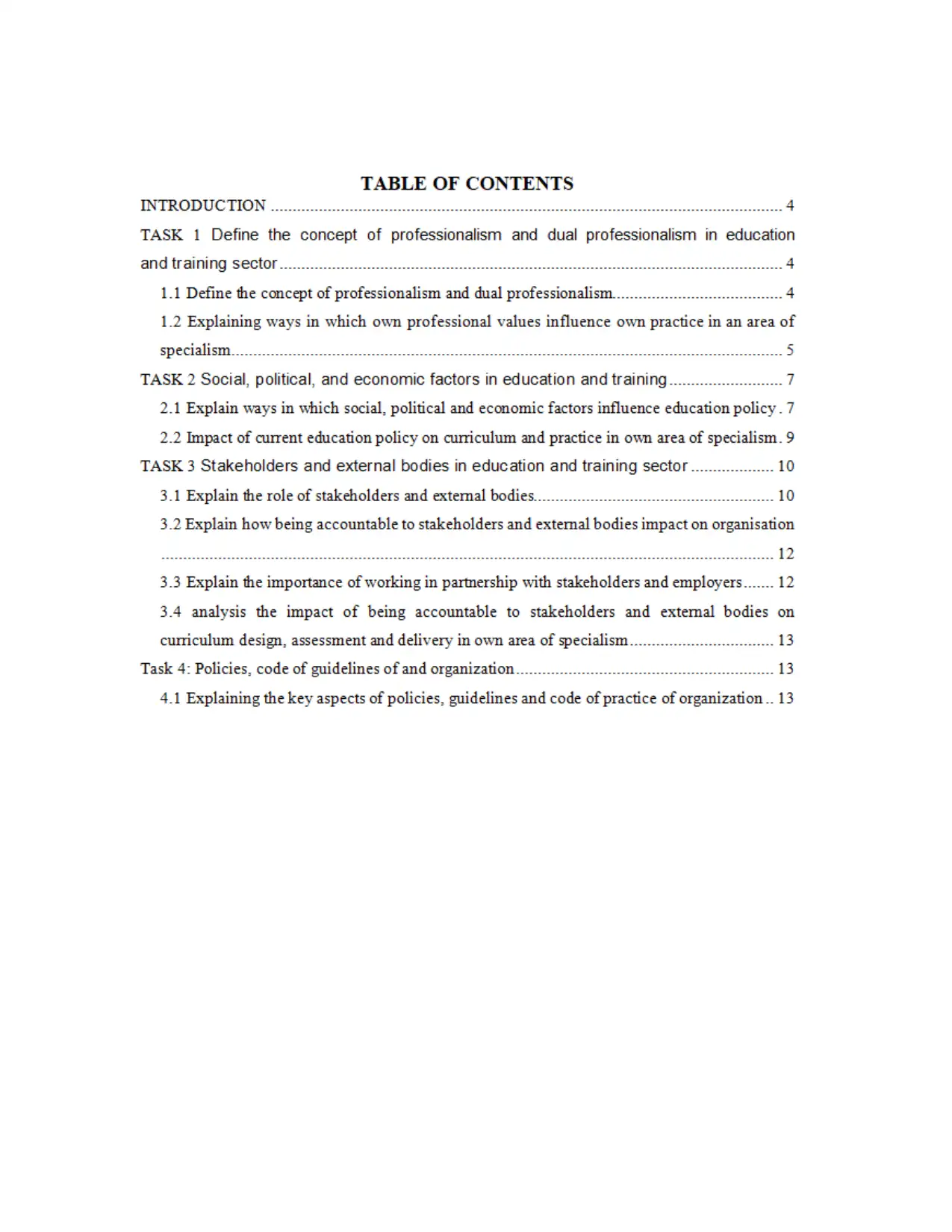
⊘ This is a preview!⊘
Do you want full access?
Subscribe today to unlock all pages.

Trusted by 1+ million students worldwide
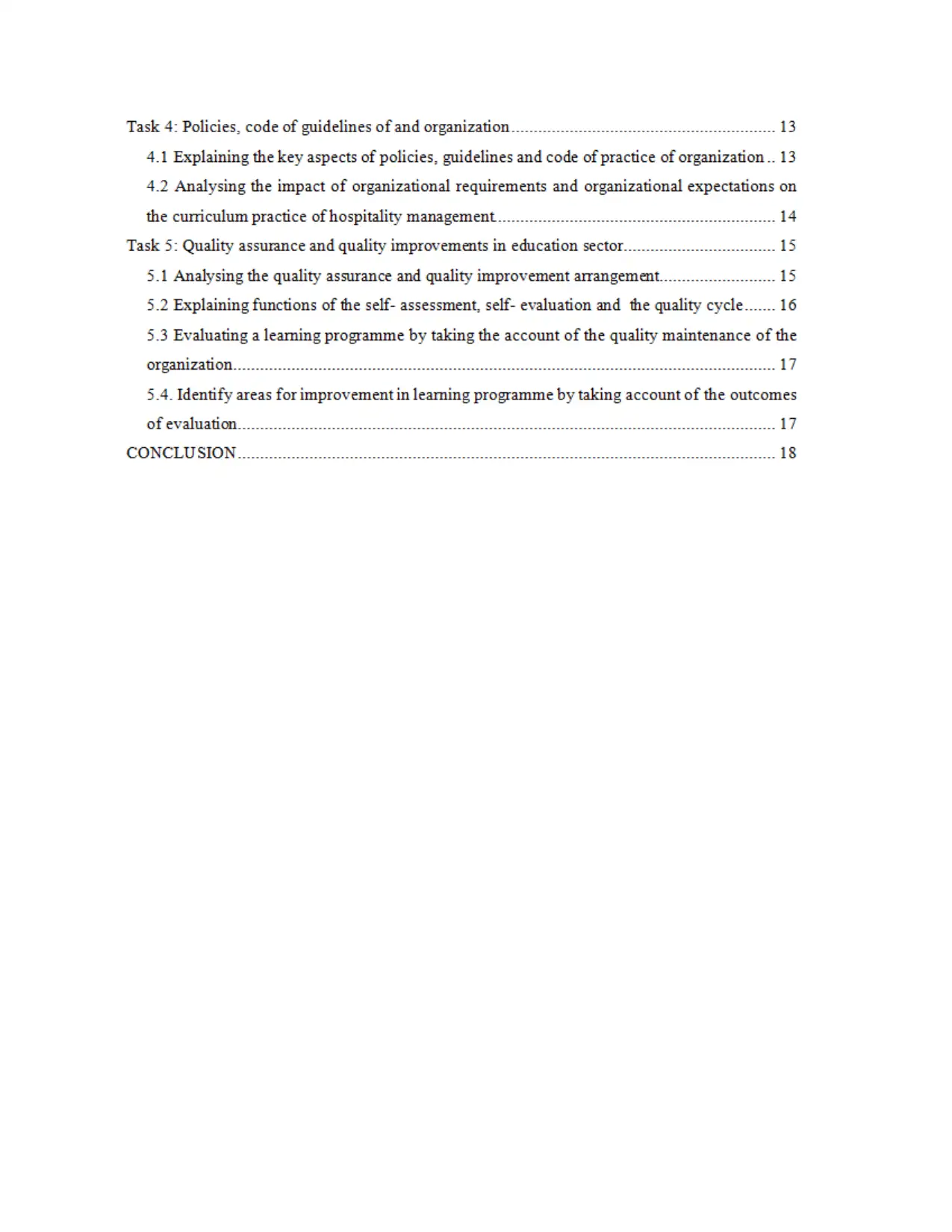
Paraphrase This Document
Need a fresh take? Get an instant paraphrase of this document with our AI Paraphraser
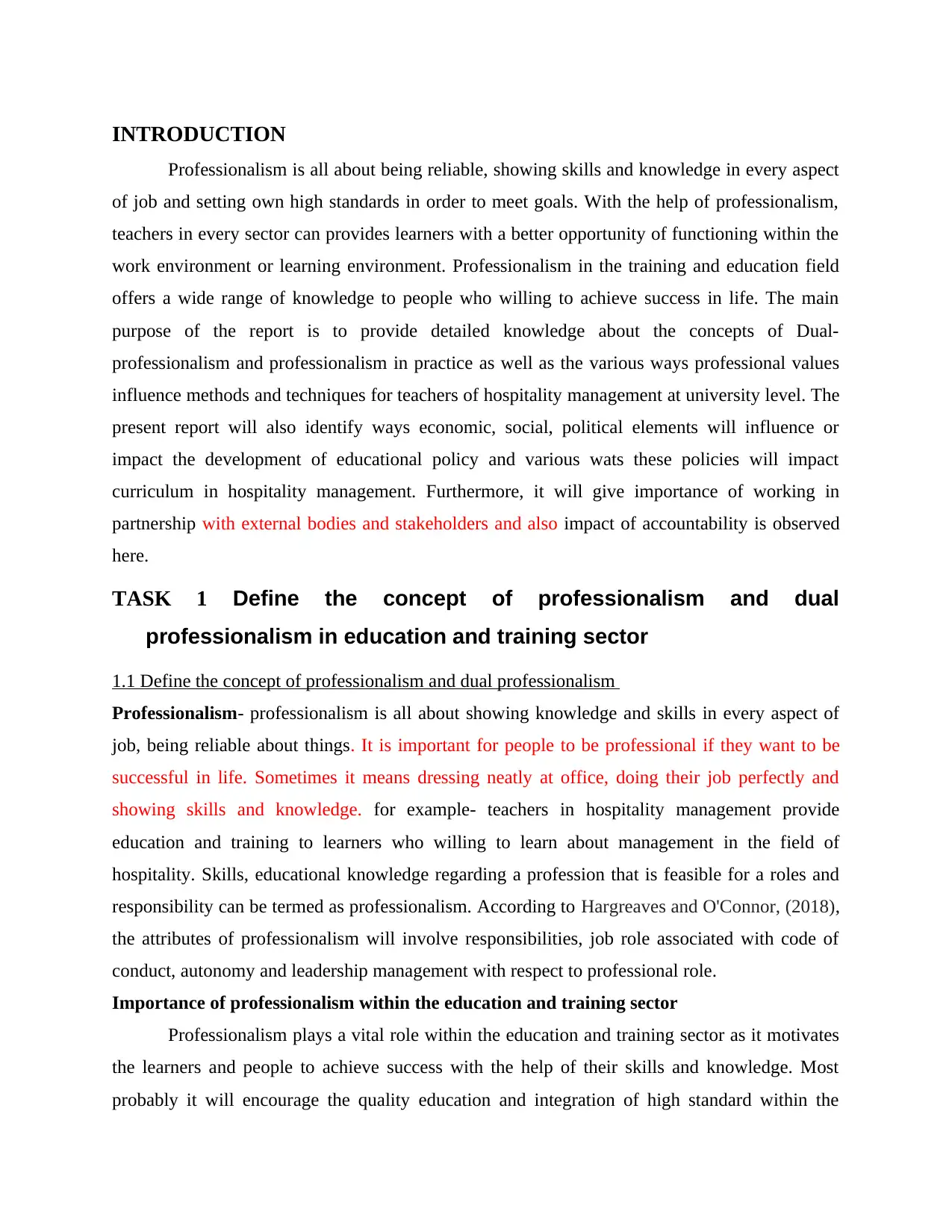
INTRODUCTION
Professionalism is all about being reliable, showing skills and knowledge in every aspect
of job and setting own high standards in order to meet goals. With the help of professionalism,
teachers in every sector can provides learners with a better opportunity of functioning within the
work environment or learning environment. Professionalism in the training and education field
offers a wide range of knowledge to people who willing to achieve success in life. The main
purpose of the report is to provide detailed knowledge about the concepts of Dual-
professionalism and professionalism in practice as well as the various ways professional values
influence methods and techniques for teachers of hospitality management at university level. The
present report will also identify ways economic, social, political elements will influence or
impact the development of educational policy and various wats these policies will impact
curriculum in hospitality management. Furthermore, it will give importance of working in
partnership with external bodies and stakeholders and also impact of accountability is observed
here.
TASK 1 Define the concept of professionalism and dual
professionalism in education and training sector
1.1 Define the concept of professionalism and dual professionalism
Professionalism- professionalism is all about showing knowledge and skills in every aspect of
job, being reliable about things. It is important for people to be professional if they want to be
successful in life. Sometimes it means dressing neatly at office, doing their job perfectly and
showing skills and knowledge. for example- teachers in hospitality management provide
education and training to learners who willing to learn about management in the field of
hospitality. Skills, educational knowledge regarding a profession that is feasible for a roles and
responsibility can be termed as professionalism. According to Hargreaves and O'Connor, (2018),
the attributes of professionalism will involve responsibilities, job role associated with code of
conduct, autonomy and leadership management with respect to professional role.
Importance of professionalism within the education and training sector
Professionalism plays a vital role within the education and training sector as it motivates
the learners and people to achieve success with the help of their skills and knowledge. Most
probably it will encourage the quality education and integration of high standard within the
Professionalism is all about being reliable, showing skills and knowledge in every aspect
of job and setting own high standards in order to meet goals. With the help of professionalism,
teachers in every sector can provides learners with a better opportunity of functioning within the
work environment or learning environment. Professionalism in the training and education field
offers a wide range of knowledge to people who willing to achieve success in life. The main
purpose of the report is to provide detailed knowledge about the concepts of Dual-
professionalism and professionalism in practice as well as the various ways professional values
influence methods and techniques for teachers of hospitality management at university level. The
present report will also identify ways economic, social, political elements will influence or
impact the development of educational policy and various wats these policies will impact
curriculum in hospitality management. Furthermore, it will give importance of working in
partnership with external bodies and stakeholders and also impact of accountability is observed
here.
TASK 1 Define the concept of professionalism and dual
professionalism in education and training sector
1.1 Define the concept of professionalism and dual professionalism
Professionalism- professionalism is all about showing knowledge and skills in every aspect of
job, being reliable about things. It is important for people to be professional if they want to be
successful in life. Sometimes it means dressing neatly at office, doing their job perfectly and
showing skills and knowledge. for example- teachers in hospitality management provide
education and training to learners who willing to learn about management in the field of
hospitality. Skills, educational knowledge regarding a profession that is feasible for a roles and
responsibility can be termed as professionalism. According to Hargreaves and O'Connor, (2018),
the attributes of professionalism will involve responsibilities, job role associated with code of
conduct, autonomy and leadership management with respect to professional role.
Importance of professionalism within the education and training sector
Professionalism plays a vital role within the education and training sector as it motivates
the learners and people to achieve success with the help of their skills and knowledge. Most
probably it will encourage the quality education and integration of high standard within the
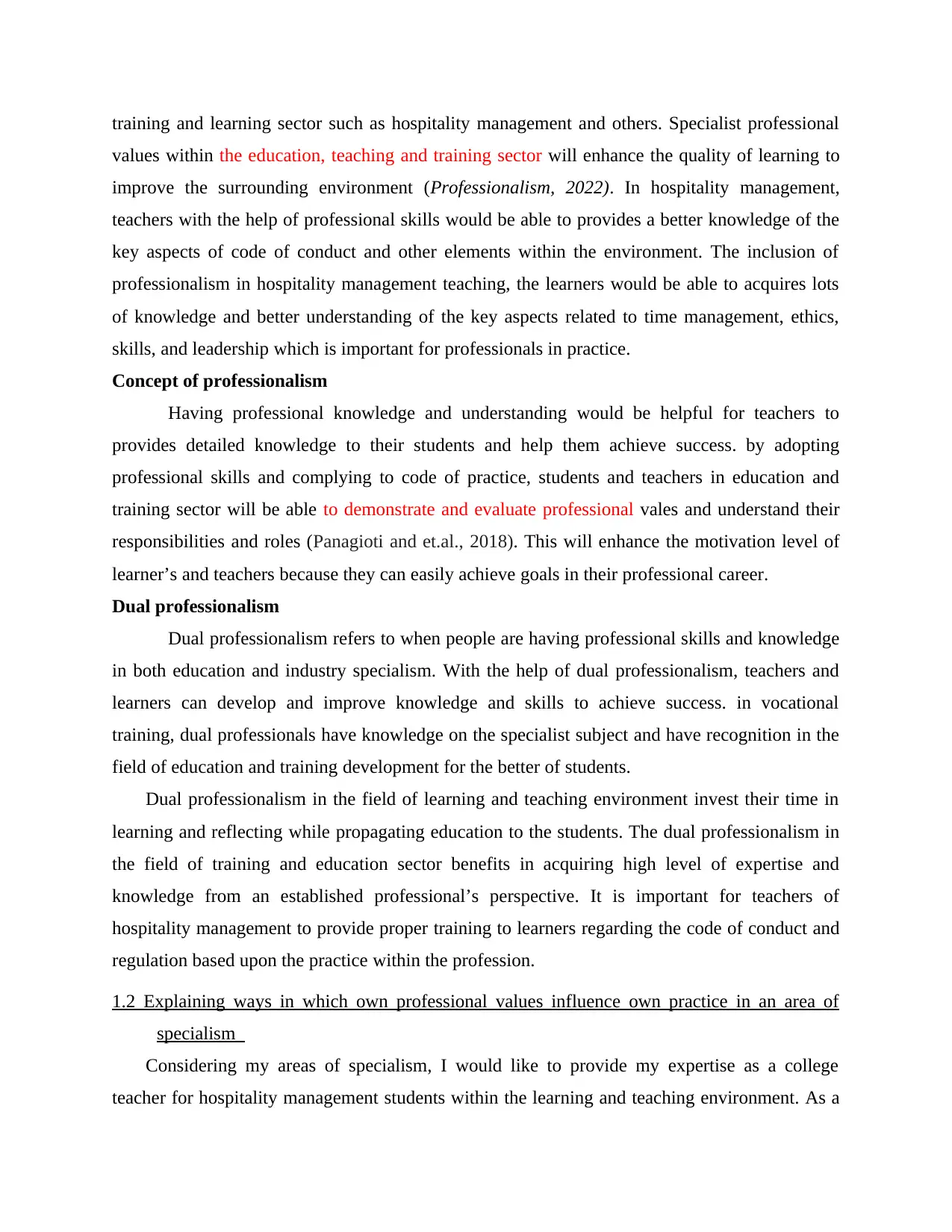
training and learning sector such as hospitality management and others. Specialist professional
values within the education, teaching and training sector will enhance the quality of learning to
improve the surrounding environment (Professionalism, 2022). In hospitality management,
teachers with the help of professional skills would be able to provides a better knowledge of the
key aspects of code of conduct and other elements within the environment. The inclusion of
professionalism in hospitality management teaching, the learners would be able to acquires lots
of knowledge and better understanding of the key aspects related to time management, ethics,
skills, and leadership which is important for professionals in practice.
Concept of professionalism
Having professional knowledge and understanding would be helpful for teachers to
provides detailed knowledge to their students and help them achieve success. by adopting
professional skills and complying to code of practice, students and teachers in education and
training sector will be able to demonstrate and evaluate professional vales and understand their
responsibilities and roles (Panagioti and et.al., 2018). This will enhance the motivation level of
learner’s and teachers because they can easily achieve goals in their professional career.
Dual professionalism
Dual professionalism refers to when people are having professional skills and knowledge
in both education and industry specialism. With the help of dual professionalism, teachers and
learners can develop and improve knowledge and skills to achieve success. in vocational
training, dual professionals have knowledge on the specialist subject and have recognition in the
field of education and training development for the better of students.
Dual professionalism in the field of learning and teaching environment invest their time in
learning and reflecting while propagating education to the students. The dual professionalism in
the field of training and education sector benefits in acquiring high level of expertise and
knowledge from an established professional’s perspective. It is important for teachers of
hospitality management to provide proper training to learners regarding the code of conduct and
regulation based upon the practice within the profession.
1.2 Explaining ways in which own professional values influence own practice in an area of
specialism
Considering my areas of specialism, I would like to provide my expertise as a college
teacher for hospitality management students within the learning and teaching environment. As a
values within the education, teaching and training sector will enhance the quality of learning to
improve the surrounding environment (Professionalism, 2022). In hospitality management,
teachers with the help of professional skills would be able to provides a better knowledge of the
key aspects of code of conduct and other elements within the environment. The inclusion of
professionalism in hospitality management teaching, the learners would be able to acquires lots
of knowledge and better understanding of the key aspects related to time management, ethics,
skills, and leadership which is important for professionals in practice.
Concept of professionalism
Having professional knowledge and understanding would be helpful for teachers to
provides detailed knowledge to their students and help them achieve success. by adopting
professional skills and complying to code of practice, students and teachers in education and
training sector will be able to demonstrate and evaluate professional vales and understand their
responsibilities and roles (Panagioti and et.al., 2018). This will enhance the motivation level of
learner’s and teachers because they can easily achieve goals in their professional career.
Dual professionalism
Dual professionalism refers to when people are having professional skills and knowledge
in both education and industry specialism. With the help of dual professionalism, teachers and
learners can develop and improve knowledge and skills to achieve success. in vocational
training, dual professionals have knowledge on the specialist subject and have recognition in the
field of education and training development for the better of students.
Dual professionalism in the field of learning and teaching environment invest their time in
learning and reflecting while propagating education to the students. The dual professionalism in
the field of training and education sector benefits in acquiring high level of expertise and
knowledge from an established professional’s perspective. It is important for teachers of
hospitality management to provide proper training to learners regarding the code of conduct and
regulation based upon the practice within the profession.
1.2 Explaining ways in which own professional values influence own practice in an area of
specialism
Considering my areas of specialism, I would like to provide my expertise as a college
teacher for hospitality management students within the learning and teaching environment. As a
⊘ This is a preview!⊘
Do you want full access?
Subscribe today to unlock all pages.

Trusted by 1+ million students worldwide
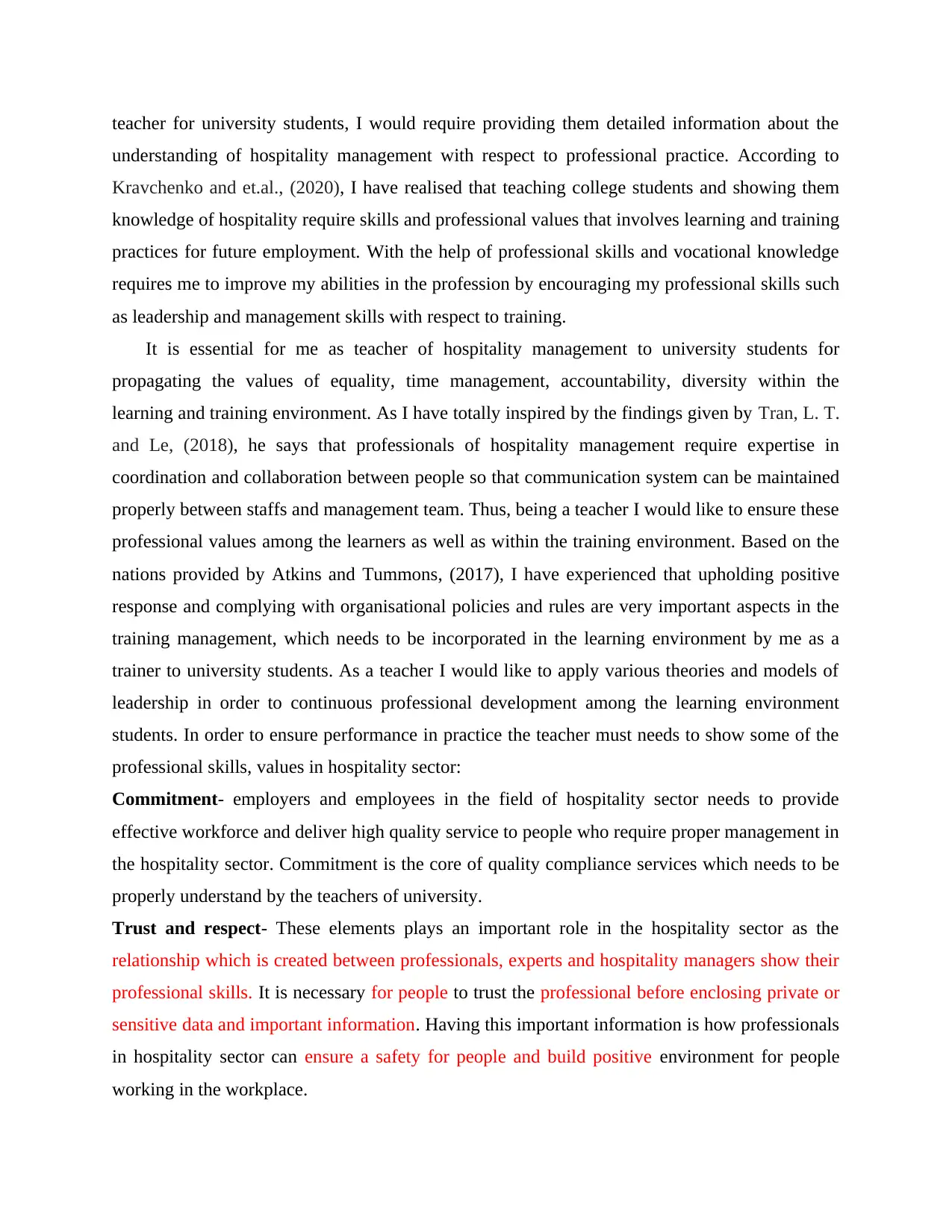
teacher for university students, I would require providing them detailed information about the
understanding of hospitality management with respect to professional practice. According to
Kravchenko and et.al., (2020), I have realised that teaching college students and showing them
knowledge of hospitality require skills and professional values that involves learning and training
practices for future employment. With the help of professional skills and vocational knowledge
requires me to improve my abilities in the profession by encouraging my professional skills such
as leadership and management skills with respect to training.
It is essential for me as teacher of hospitality management to university students for
propagating the values of equality, time management, accountability, diversity within the
learning and training environment. As I have totally inspired by the findings given by Tran, L. T.
and Le, (2018), he says that professionals of hospitality management require expertise in
coordination and collaboration between people so that communication system can be maintained
properly between staffs and management team. Thus, being a teacher I would like to ensure these
professional values among the learners as well as within the training environment. Based on the
nations provided by Atkins and Tummons, (2017), I have experienced that upholding positive
response and complying with organisational policies and rules are very important aspects in the
training management, which needs to be incorporated in the learning environment by me as a
trainer to university students. As a teacher I would like to apply various theories and models of
leadership in order to continuous professional development among the learning environment
students. In order to ensure performance in practice the teacher must needs to show some of the
professional skills, values in hospitality sector:
Commitment- employers and employees in the field of hospitality sector needs to provide
effective workforce and deliver high quality service to people who require proper management in
the hospitality sector. Commitment is the core of quality compliance services which needs to be
properly understand by the teachers of university.
Trust and respect- These elements plays an important role in the hospitality sector as the
relationship which is created between professionals, experts and hospitality managers show their
professional skills. It is necessary for people to trust the professional before enclosing private or
sensitive data and important information. Having this important information is how professionals
in hospitality sector can ensure a safety for people and build positive environment for people
working in the workplace.
understanding of hospitality management with respect to professional practice. According to
Kravchenko and et.al., (2020), I have realised that teaching college students and showing them
knowledge of hospitality require skills and professional values that involves learning and training
practices for future employment. With the help of professional skills and vocational knowledge
requires me to improve my abilities in the profession by encouraging my professional skills such
as leadership and management skills with respect to training.
It is essential for me as teacher of hospitality management to university students for
propagating the values of equality, time management, accountability, diversity within the
learning and training environment. As I have totally inspired by the findings given by Tran, L. T.
and Le, (2018), he says that professionals of hospitality management require expertise in
coordination and collaboration between people so that communication system can be maintained
properly between staffs and management team. Thus, being a teacher I would like to ensure these
professional values among the learners as well as within the training environment. Based on the
nations provided by Atkins and Tummons, (2017), I have experienced that upholding positive
response and complying with organisational policies and rules are very important aspects in the
training management, which needs to be incorporated in the learning environment by me as a
trainer to university students. As a teacher I would like to apply various theories and models of
leadership in order to continuous professional development among the learning environment
students. In order to ensure performance in practice the teacher must needs to show some of the
professional skills, values in hospitality sector:
Commitment- employers and employees in the field of hospitality sector needs to provide
effective workforce and deliver high quality service to people who require proper management in
the hospitality sector. Commitment is the core of quality compliance services which needs to be
properly understand by the teachers of university.
Trust and respect- These elements plays an important role in the hospitality sector as the
relationship which is created between professionals, experts and hospitality managers show their
professional skills. It is necessary for people to trust the professional before enclosing private or
sensitive data and important information. Having this important information is how professionals
in hospitality sector can ensure a safety for people and build positive environment for people
working in the workplace.
Paraphrase This Document
Need a fresh take? Get an instant paraphrase of this document with our AI Paraphraser
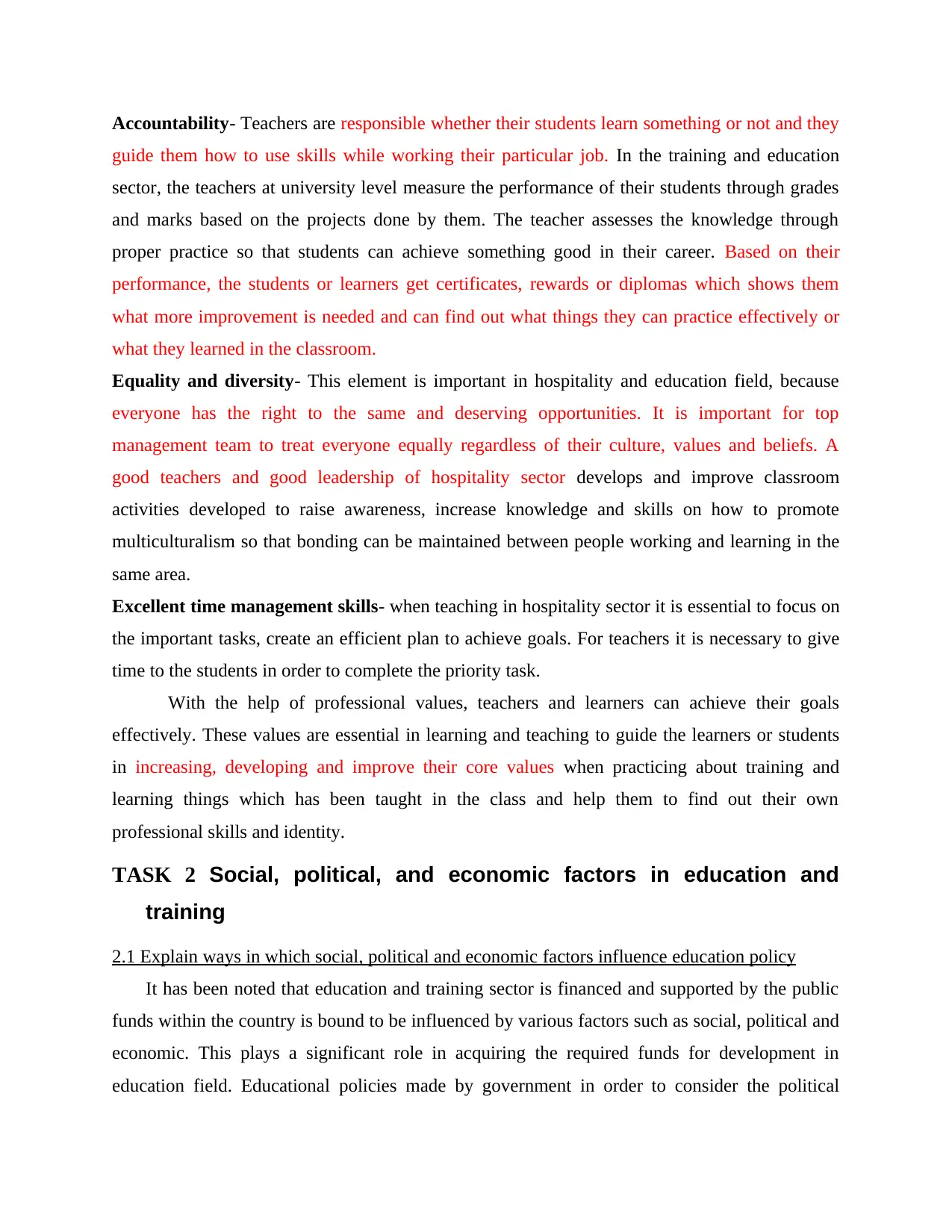
Accountability- Teachers are responsible whether their students learn something or not and they
guide them how to use skills while working their particular job. In the training and education
sector, the teachers at university level measure the performance of their students through grades
and marks based on the projects done by them. The teacher assesses the knowledge through
proper practice so that students can achieve something good in their career. Based on their
performance, the students or learners get certificates, rewards or diplomas which shows them
what more improvement is needed and can find out what things they can practice effectively or
what they learned in the classroom.
Equality and diversity- This element is important in hospitality and education field, because
everyone has the right to the same and deserving opportunities. It is important for top
management team to treat everyone equally regardless of their culture, values and beliefs. A
good teachers and good leadership of hospitality sector develops and improve classroom
activities developed to raise awareness, increase knowledge and skills on how to promote
multiculturalism so that bonding can be maintained between people working and learning in the
same area.
Excellent time management skills- when teaching in hospitality sector it is essential to focus on
the important tasks, create an efficient plan to achieve goals. For teachers it is necessary to give
time to the students in order to complete the priority task.
With the help of professional values, teachers and learners can achieve their goals
effectively. These values are essential in learning and teaching to guide the learners or students
in increasing, developing and improve their core values when practicing about training and
learning things which has been taught in the class and help them to find out their own
professional skills and identity.
TASK 2 Social, political, and economic factors in education and
training
2.1 Explain ways in which social, political and economic factors influence education policy
It has been noted that education and training sector is financed and supported by the public
funds within the country is bound to be influenced by various factors such as social, political and
economic. This plays a significant role in acquiring the required funds for development in
education field. Educational policies made by government in order to consider the political
guide them how to use skills while working their particular job. In the training and education
sector, the teachers at university level measure the performance of their students through grades
and marks based on the projects done by them. The teacher assesses the knowledge through
proper practice so that students can achieve something good in their career. Based on their
performance, the students or learners get certificates, rewards or diplomas which shows them
what more improvement is needed and can find out what things they can practice effectively or
what they learned in the classroom.
Equality and diversity- This element is important in hospitality and education field, because
everyone has the right to the same and deserving opportunities. It is important for top
management team to treat everyone equally regardless of their culture, values and beliefs. A
good teachers and good leadership of hospitality sector develops and improve classroom
activities developed to raise awareness, increase knowledge and skills on how to promote
multiculturalism so that bonding can be maintained between people working and learning in the
same area.
Excellent time management skills- when teaching in hospitality sector it is essential to focus on
the important tasks, create an efficient plan to achieve goals. For teachers it is necessary to give
time to the students in order to complete the priority task.
With the help of professional values, teachers and learners can achieve their goals
effectively. These values are essential in learning and teaching to guide the learners or students
in increasing, developing and improve their core values when practicing about training and
learning things which has been taught in the class and help them to find out their own
professional skills and identity.
TASK 2 Social, political, and economic factors in education and
training
2.1 Explain ways in which social, political and economic factors influence education policy
It has been noted that education and training sector is financed and supported by the public
funds within the country is bound to be influenced by various factors such as social, political and
economic. This plays a significant role in acquiring the required funds for development in
education field. Educational policies made by government in order to consider the political
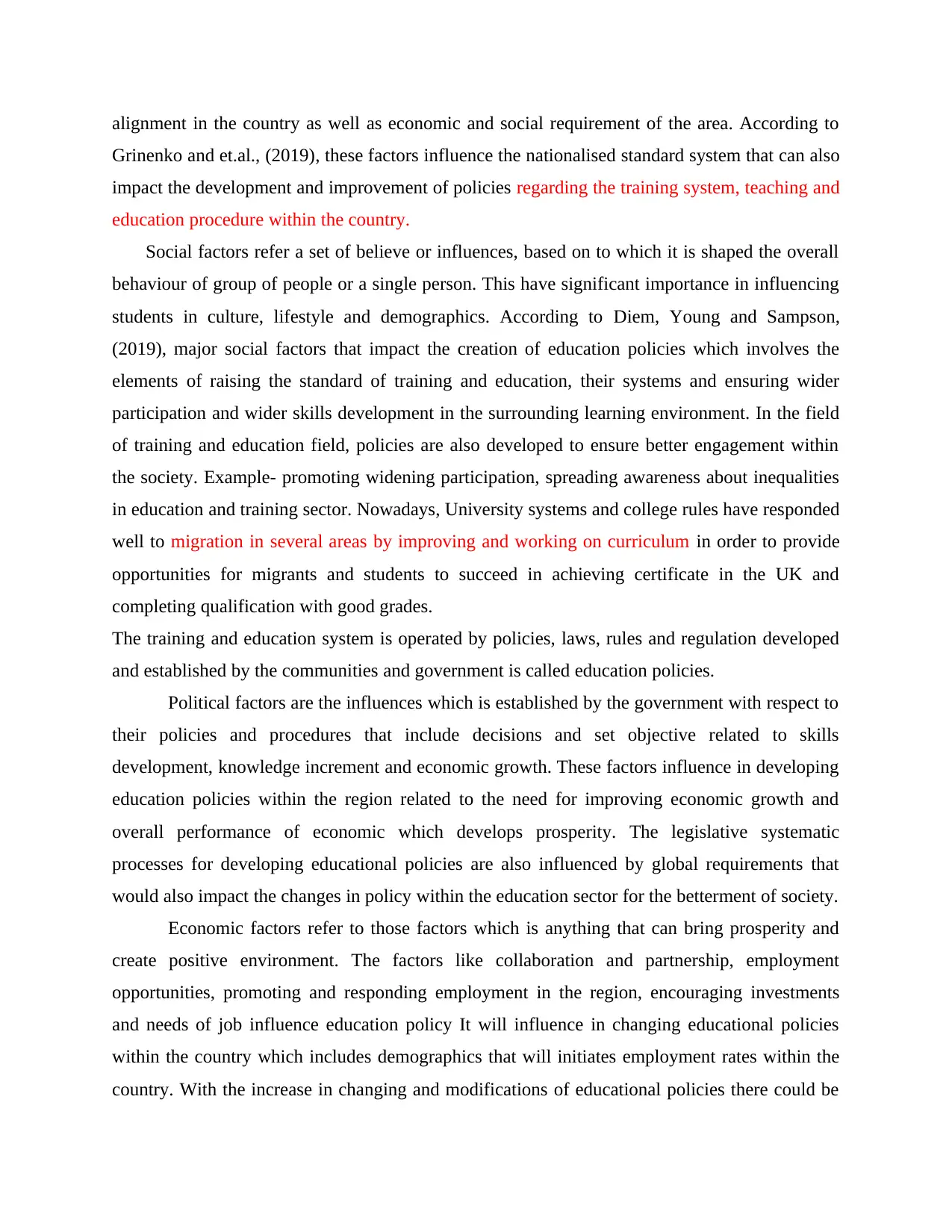
alignment in the country as well as economic and social requirement of the area. According to
Grinenko and et.al., (2019), these factors influence the nationalised standard system that can also
impact the development and improvement of policies regarding the training system, teaching and
education procedure within the country.
Social factors refer a set of believe or influences, based on to which it is shaped the overall
behaviour of group of people or a single person. This have significant importance in influencing
students in culture, lifestyle and demographics. According to Diem, Young and Sampson,
(2019), major social factors that impact the creation of education policies which involves the
elements of raising the standard of training and education, their systems and ensuring wider
participation and wider skills development in the surrounding learning environment. In the field
of training and education field, policies are also developed to ensure better engagement within
the society. Example- promoting widening participation, spreading awareness about inequalities
in education and training sector. Nowadays, University systems and college rules have responded
well to migration in several areas by improving and working on curriculum in order to provide
opportunities for migrants and students to succeed in achieving certificate in the UK and
completing qualification with good grades.
The training and education system is operated by policies, laws, rules and regulation developed
and established by the communities and government is called education policies.
Political factors are the influences which is established by the government with respect to
their policies and procedures that include decisions and set objective related to skills
development, knowledge increment and economic growth. These factors influence in developing
education policies within the region related to the need for improving economic growth and
overall performance of economic which develops prosperity. The legislative systematic
processes for developing educational policies are also influenced by global requirements that
would also impact the changes in policy within the education sector for the betterment of society.
Economic factors refer to those factors which is anything that can bring prosperity and
create positive environment. The factors like collaboration and partnership, employment
opportunities, promoting and responding employment in the region, encouraging investments
and needs of job influence education policy It will influence in changing educational policies
within the country which includes demographics that will initiates employment rates within the
country. With the increase in changing and modifications of educational policies there could be
Grinenko and et.al., (2019), these factors influence the nationalised standard system that can also
impact the development and improvement of policies regarding the training system, teaching and
education procedure within the country.
Social factors refer a set of believe or influences, based on to which it is shaped the overall
behaviour of group of people or a single person. This have significant importance in influencing
students in culture, lifestyle and demographics. According to Diem, Young and Sampson,
(2019), major social factors that impact the creation of education policies which involves the
elements of raising the standard of training and education, their systems and ensuring wider
participation and wider skills development in the surrounding learning environment. In the field
of training and education field, policies are also developed to ensure better engagement within
the society. Example- promoting widening participation, spreading awareness about inequalities
in education and training sector. Nowadays, University systems and college rules have responded
well to migration in several areas by improving and working on curriculum in order to provide
opportunities for migrants and students to succeed in achieving certificate in the UK and
completing qualification with good grades.
The training and education system is operated by policies, laws, rules and regulation developed
and established by the communities and government is called education policies.
Political factors are the influences which is established by the government with respect to
their policies and procedures that include decisions and set objective related to skills
development, knowledge increment and economic growth. These factors influence in developing
education policies within the region related to the need for improving economic growth and
overall performance of economic which develops prosperity. The legislative systematic
processes for developing educational policies are also influenced by global requirements that
would also impact the changes in policy within the education sector for the betterment of society.
Economic factors refer to those factors which is anything that can bring prosperity and
create positive environment. The factors like collaboration and partnership, employment
opportunities, promoting and responding employment in the region, encouraging investments
and needs of job influence education policy It will influence in changing educational policies
within the country which includes demographics that will initiates employment rates within the
country. With the increase in changing and modifications of educational policies there could be
⊘ This is a preview!⊘
Do you want full access?
Subscribe today to unlock all pages.

Trusted by 1+ million students worldwide
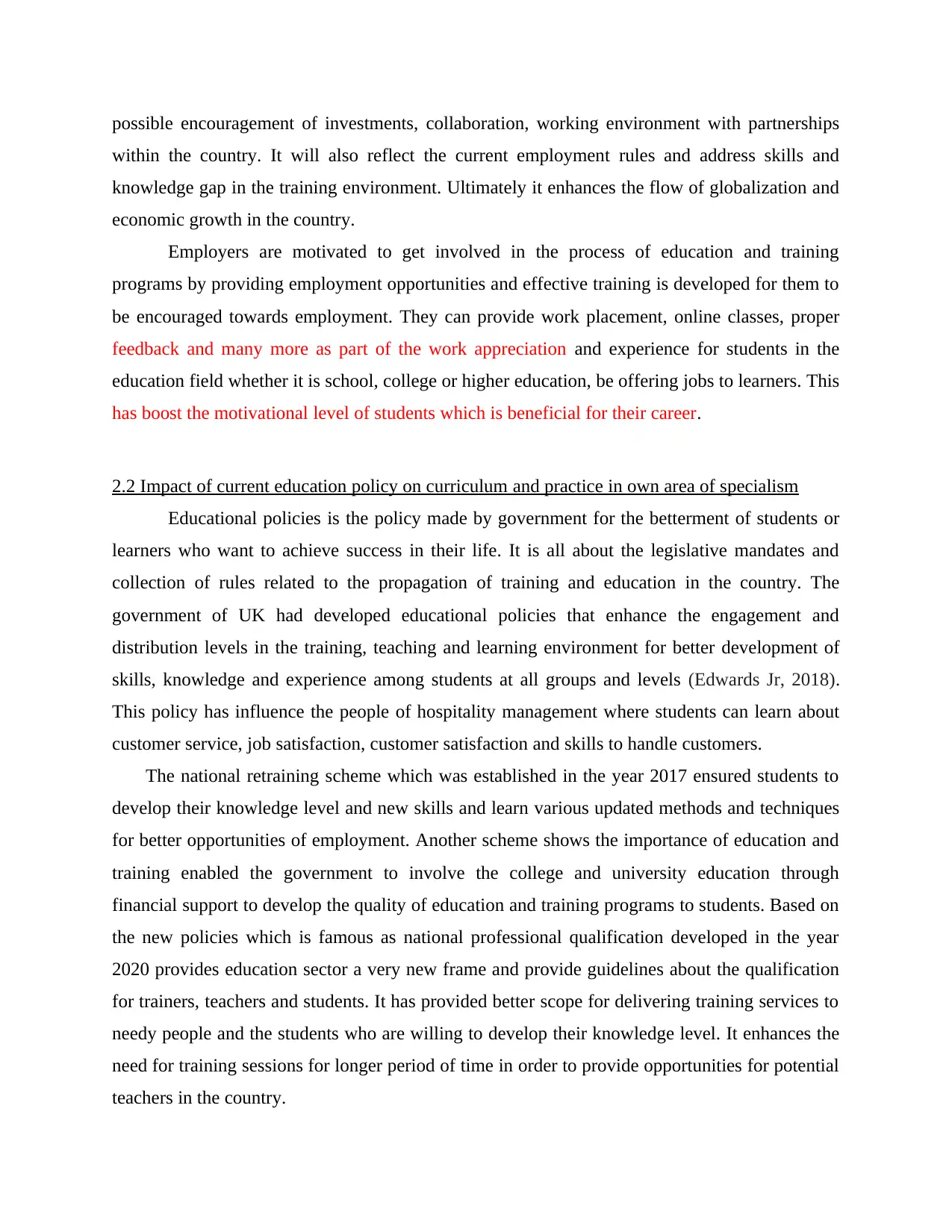
possible encouragement of investments, collaboration, working environment with partnerships
within the country. It will also reflect the current employment rules and address skills and
knowledge gap in the training environment. Ultimately it enhances the flow of globalization and
economic growth in the country.
Employers are motivated to get involved in the process of education and training
programs by providing employment opportunities and effective training is developed for them to
be encouraged towards employment. They can provide work placement, online classes, proper
feedback and many more as part of the work appreciation and experience for students in the
education field whether it is school, college or higher education, be offering jobs to learners. This
has boost the motivational level of students which is beneficial for their career.
2.2 Impact of current education policy on curriculum and practice in own area of specialism
Educational policies is the policy made by government for the betterment of students or
learners who want to achieve success in their life. It is all about the legislative mandates and
collection of rules related to the propagation of training and education in the country. The
government of UK had developed educational policies that enhance the engagement and
distribution levels in the training, teaching and learning environment for better development of
skills, knowledge and experience among students at all groups and levels (Edwards Jr, 2018).
This policy has influence the people of hospitality management where students can learn about
customer service, job satisfaction, customer satisfaction and skills to handle customers.
The national retraining scheme which was established in the year 2017 ensured students to
develop their knowledge level and new skills and learn various updated methods and techniques
for better opportunities of employment. Another scheme shows the importance of education and
training enabled the government to involve the college and university education through
financial support to develop the quality of education and training programs to students. Based on
the new policies which is famous as national professional qualification developed in the year
2020 provides education sector a very new frame and provide guidelines about the qualification
for trainers, teachers and students. It has provided better scope for delivering training services to
needy people and the students who are willing to develop their knowledge level. It enhances the
need for training sessions for longer period of time in order to provide opportunities for potential
teachers in the country.
within the country. It will also reflect the current employment rules and address skills and
knowledge gap in the training environment. Ultimately it enhances the flow of globalization and
economic growth in the country.
Employers are motivated to get involved in the process of education and training
programs by providing employment opportunities and effective training is developed for them to
be encouraged towards employment. They can provide work placement, online classes, proper
feedback and many more as part of the work appreciation and experience for students in the
education field whether it is school, college or higher education, be offering jobs to learners. This
has boost the motivational level of students which is beneficial for their career.
2.2 Impact of current education policy on curriculum and practice in own area of specialism
Educational policies is the policy made by government for the betterment of students or
learners who want to achieve success in their life. It is all about the legislative mandates and
collection of rules related to the propagation of training and education in the country. The
government of UK had developed educational policies that enhance the engagement and
distribution levels in the training, teaching and learning environment for better development of
skills, knowledge and experience among students at all groups and levels (Edwards Jr, 2018).
This policy has influence the people of hospitality management where students can learn about
customer service, job satisfaction, customer satisfaction and skills to handle customers.
The national retraining scheme which was established in the year 2017 ensured students to
develop their knowledge level and new skills and learn various updated methods and techniques
for better opportunities of employment. Another scheme shows the importance of education and
training enabled the government to involve the college and university education through
financial support to develop the quality of education and training programs to students. Based on
the new policies which is famous as national professional qualification developed in the year
2020 provides education sector a very new frame and provide guidelines about the qualification
for trainers, teachers and students. It has provided better scope for delivering training services to
needy people and the students who are willing to develop their knowledge level. It enhances the
need for training sessions for longer period of time in order to provide opportunities for potential
teachers in the country.
Paraphrase This Document
Need a fresh take? Get an instant paraphrase of this document with our AI Paraphraser
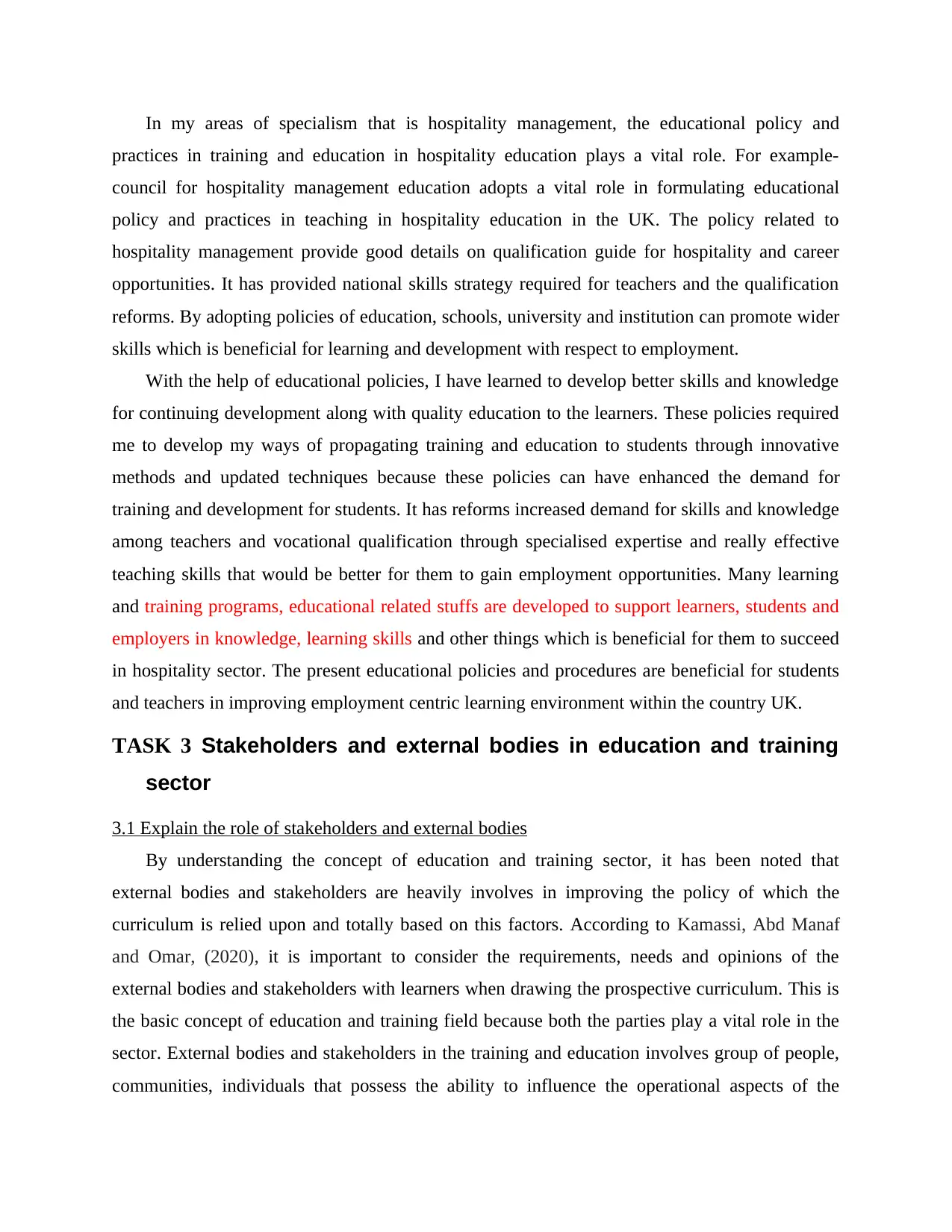
In my areas of specialism that is hospitality management, the educational policy and
practices in training and education in hospitality education plays a vital role. For example-
council for hospitality management education adopts a vital role in formulating educational
policy and practices in teaching in hospitality education in the UK. The policy related to
hospitality management provide good details on qualification guide for hospitality and career
opportunities. It has provided national skills strategy required for teachers and the qualification
reforms. By adopting policies of education, schools, university and institution can promote wider
skills which is beneficial for learning and development with respect to employment.
With the help of educational policies, I have learned to develop better skills and knowledge
for continuing development along with quality education to the learners. These policies required
me to develop my ways of propagating training and education to students through innovative
methods and updated techniques because these policies can have enhanced the demand for
training and development for students. It has reforms increased demand for skills and knowledge
among teachers and vocational qualification through specialised expertise and really effective
teaching skills that would be better for them to gain employment opportunities. Many learning
and training programs, educational related stuffs are developed to support learners, students and
employers in knowledge, learning skills and other things which is beneficial for them to succeed
in hospitality sector. The present educational policies and procedures are beneficial for students
and teachers in improving employment centric learning environment within the country UK.
TASK 3 Stakeholders and external bodies in education and training
sector
3.1 Explain the role of stakeholders and external bodies
By understanding the concept of education and training sector, it has been noted that
external bodies and stakeholders are heavily involves in improving the policy of which the
curriculum is relied upon and totally based on this factors. According to Kamassi, Abd Manaf
and Omar, (2020), it is important to consider the requirements, needs and opinions of the
external bodies and stakeholders with learners when drawing the prospective curriculum. This is
the basic concept of education and training field because both the parties play a vital role in the
sector. External bodies and stakeholders in the training and education involves group of people,
communities, individuals that possess the ability to influence the operational aspects of the
practices in training and education in hospitality education plays a vital role. For example-
council for hospitality management education adopts a vital role in formulating educational
policy and practices in teaching in hospitality education in the UK. The policy related to
hospitality management provide good details on qualification guide for hospitality and career
opportunities. It has provided national skills strategy required for teachers and the qualification
reforms. By adopting policies of education, schools, university and institution can promote wider
skills which is beneficial for learning and development with respect to employment.
With the help of educational policies, I have learned to develop better skills and knowledge
for continuing development along with quality education to the learners. These policies required
me to develop my ways of propagating training and education to students through innovative
methods and updated techniques because these policies can have enhanced the demand for
training and development for students. It has reforms increased demand for skills and knowledge
among teachers and vocational qualification through specialised expertise and really effective
teaching skills that would be better for them to gain employment opportunities. Many learning
and training programs, educational related stuffs are developed to support learners, students and
employers in knowledge, learning skills and other things which is beneficial for them to succeed
in hospitality sector. The present educational policies and procedures are beneficial for students
and teachers in improving employment centric learning environment within the country UK.
TASK 3 Stakeholders and external bodies in education and training
sector
3.1 Explain the role of stakeholders and external bodies
By understanding the concept of education and training sector, it has been noted that
external bodies and stakeholders are heavily involves in improving the policy of which the
curriculum is relied upon and totally based on this factors. According to Kamassi, Abd Manaf
and Omar, (2020), it is important to consider the requirements, needs and opinions of the
external bodies and stakeholders with learners when drawing the prospective curriculum. This is
the basic concept of education and training field because both the parties play a vital role in the
sector. External bodies and stakeholders in the training and education involves group of people,
communities, individuals that possess the ability to influence the operational aspects of the
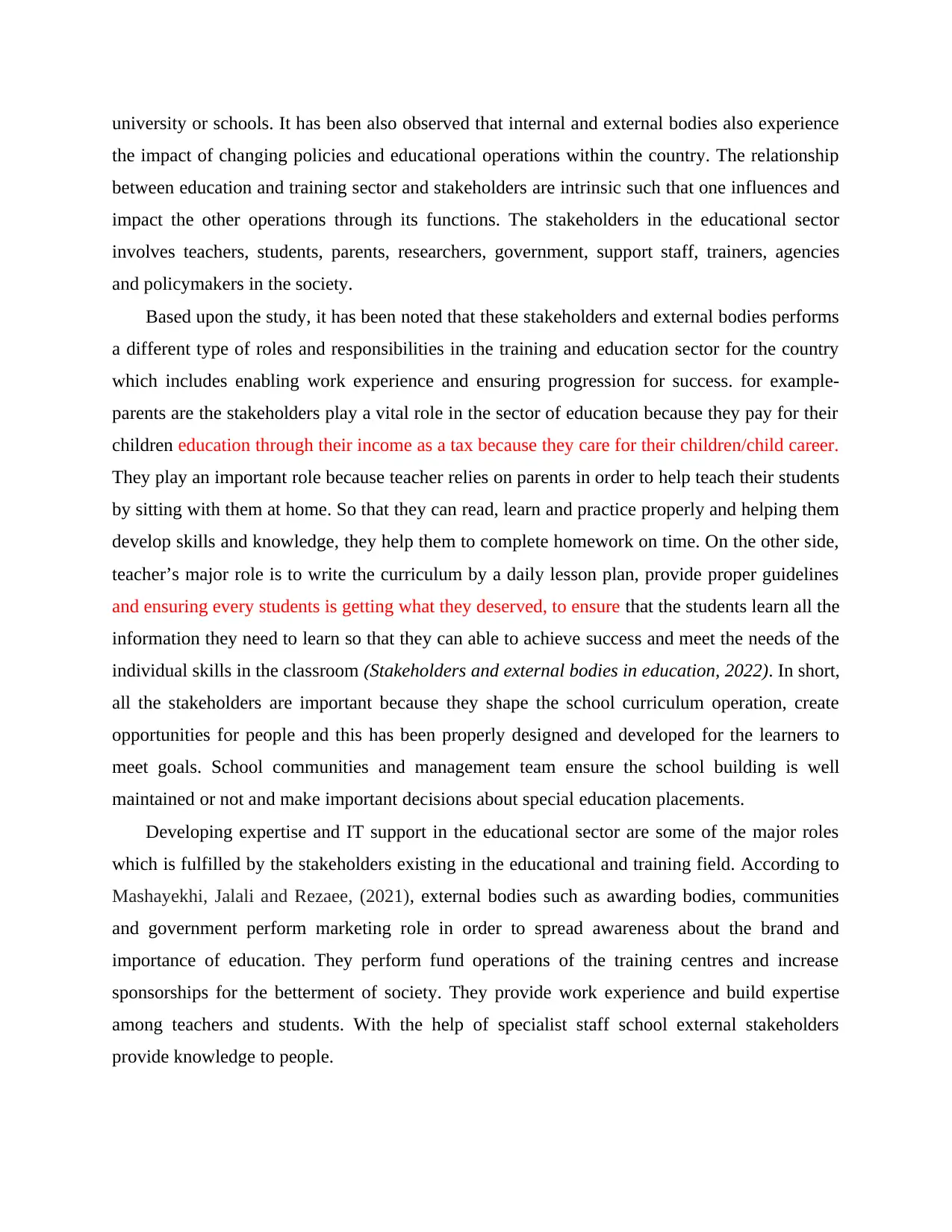
university or schools. It has been also observed that internal and external bodies also experience
the impact of changing policies and educational operations within the country. The relationship
between education and training sector and stakeholders are intrinsic such that one influences and
impact the other operations through its functions. The stakeholders in the educational sector
involves teachers, students, parents, researchers, government, support staff, trainers, agencies
and policymakers in the society.
Based upon the study, it has been noted that these stakeholders and external bodies performs
a different type of roles and responsibilities in the training and education sector for the country
which includes enabling work experience and ensuring progression for success. for example-
parents are the stakeholders play a vital role in the sector of education because they pay for their
children education through their income as a tax because they care for their children/child career.
They play an important role because teacher relies on parents in order to help teach their students
by sitting with them at home. So that they can read, learn and practice properly and helping them
develop skills and knowledge, they help them to complete homework on time. On the other side,
teacher’s major role is to write the curriculum by a daily lesson plan, provide proper guidelines
and ensuring every students is getting what they deserved, to ensure that the students learn all the
information they need to learn so that they can able to achieve success and meet the needs of the
individual skills in the classroom (Stakeholders and external bodies in education, 2022). In short,
all the stakeholders are important because they shape the school curriculum operation, create
opportunities for people and this has been properly designed and developed for the learners to
meet goals. School communities and management team ensure the school building is well
maintained or not and make important decisions about special education placements.
Developing expertise and IT support in the educational sector are some of the major roles
which is fulfilled by the stakeholders existing in the educational and training field. According to
Mashayekhi, Jalali and Rezaee, (2021), external bodies such as awarding bodies, communities
and government perform marketing role in order to spread awareness about the brand and
importance of education. They perform fund operations of the training centres and increase
sponsorships for the betterment of society. They provide work experience and build expertise
among teachers and students. With the help of specialist staff school external stakeholders
provide knowledge to people.
the impact of changing policies and educational operations within the country. The relationship
between education and training sector and stakeholders are intrinsic such that one influences and
impact the other operations through its functions. The stakeholders in the educational sector
involves teachers, students, parents, researchers, government, support staff, trainers, agencies
and policymakers in the society.
Based upon the study, it has been noted that these stakeholders and external bodies performs
a different type of roles and responsibilities in the training and education sector for the country
which includes enabling work experience and ensuring progression for success. for example-
parents are the stakeholders play a vital role in the sector of education because they pay for their
children education through their income as a tax because they care for their children/child career.
They play an important role because teacher relies on parents in order to help teach their students
by sitting with them at home. So that they can read, learn and practice properly and helping them
develop skills and knowledge, they help them to complete homework on time. On the other side,
teacher’s major role is to write the curriculum by a daily lesson plan, provide proper guidelines
and ensuring every students is getting what they deserved, to ensure that the students learn all the
information they need to learn so that they can able to achieve success and meet the needs of the
individual skills in the classroom (Stakeholders and external bodies in education, 2022). In short,
all the stakeholders are important because they shape the school curriculum operation, create
opportunities for people and this has been properly designed and developed for the learners to
meet goals. School communities and management team ensure the school building is well
maintained or not and make important decisions about special education placements.
Developing expertise and IT support in the educational sector are some of the major roles
which is fulfilled by the stakeholders existing in the educational and training field. According to
Mashayekhi, Jalali and Rezaee, (2021), external bodies such as awarding bodies, communities
and government perform marketing role in order to spread awareness about the brand and
importance of education. They perform fund operations of the training centres and increase
sponsorships for the betterment of society. They provide work experience and build expertise
among teachers and students. With the help of specialist staff school external stakeholders
provide knowledge to people.
⊘ This is a preview!⊘
Do you want full access?
Subscribe today to unlock all pages.

Trusted by 1+ million students worldwide
1 out of 21
Related Documents
Your All-in-One AI-Powered Toolkit for Academic Success.
+13062052269
info@desklib.com
Available 24*7 on WhatsApp / Email
![[object Object]](/_next/static/media/star-bottom.7253800d.svg)
Unlock your academic potential
Copyright © 2020–2026 A2Z Services. All Rights Reserved. Developed and managed by ZUCOL.




